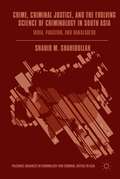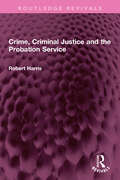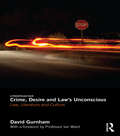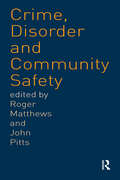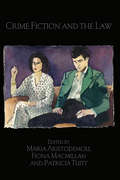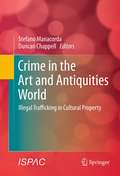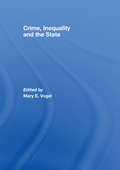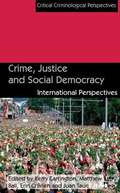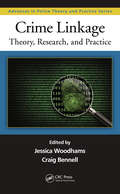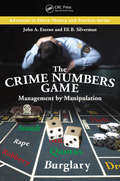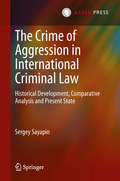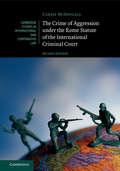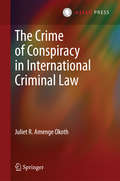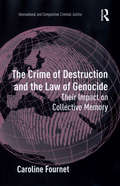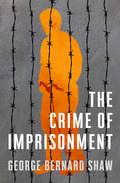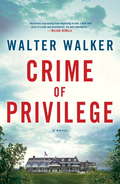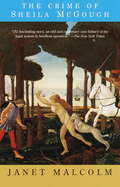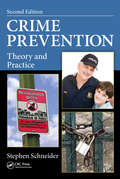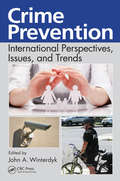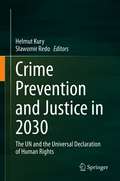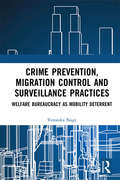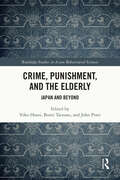- Table View
- List View
Crime, Criminal Justice, and the Evolving Science of Criminology in South Asia: India, Pakistan, and Bangladesh (Palgrave Advances in Criminology and Criminal Justice in Asia)
by Shahid M. ShahidullahWritten by some of the most notable criminologists of South Asia, this book examines advances in law, criminal justice, and criminology in South Asia with particular reference to India, Pakistan, and Bangladesh. The edited collection explores, on the basis of surveys, interviews, court records, and legislative documents, a wide range of timely issues such as: the impacts of modernization and globalization on laws combating violence against women and children, evolution of rape laws and the issues of gender justice, laws for combating online child sexual abuse, transformation in juvenile justice, integration of women into policing, the dynamics of violence and civility, and the birth of colonial criminology in South Asia. Students of criminology and criminal justice, practitioners, policy-makers, and human rights advocates will find this distinctive volume highly valuable.
Crime, Criminal Justice and the Probation Service (Routledge Revivals)
by Robert HarrisFirst published in 1992, Crime, Criminal Justice and the Probation Service is a thought-provoking analysis of the role of the probation service in developing an integrated system of criminal justice. Robert Harris provides readable information about our knowledge of such areas as criminal statistics, victims, fear of crime and crime prevention. He also explores the treatment of women and ethnic minorities by the criminal justice system, the question of a sentencing council and the future of community corrections. A central theme is that all the professionals involved in the criminal justice system must work more closely together so that the mistakes of the past can be avoided in the future. The book therefore has a wide appeal not only to probation officers and social workers, but also to criminal justice professionals and administrators, including the police and the legal profession.
Crime, Desire and Law's Unconscious: Law, Literature and Culture
by David GurnhamSexual desire, and the possible dangers associated with its more extreme manifestations, provokes strong, albeit often contradictory reactions. Such reactions are a well-known stimulant of creative, juridical and scholarly activity, and the texts of law, literature and academic criticism respond to it in ways that suggest both of revulsion and fascination. But how are we to understand such responses, and what can they tell us about the relationship between law and its‘others’? Exploring these questions in the context of HIV transmission, on-street sexual exploitation and erotic asphyxiation, this book draws on psychoanalytic theory in order to understand the motivations behind legal, literary and cultural constructions of sexual offences, their perpetrators and victims. Its analysis of these constructions in a diverse range of sources - including appeal judgments in England & Wales and North America, criminal trials and their reporting, visual and linguistic cultures and both modern and ‘classical’ literature – will be of great interest to legal theorists and socio-legal scholars, as well as those with relevant concerns in the fields of literature and cultural studies.
Crime, Disorder and Community Safety: A New Agenda?
by Roger Matthews John PittsThis book provides an analytic overview and assessment of the changing nature of crime prevention, disorder and community safety in contemporary society. Bringing together nine original articles from leading national and international authorities on these issues, the book examines recent developments in relation to a number of specific groups - the disadvantaged, the socially excluded, youth, women and ethnic minorities. Topics covered include:* the increase in local authority responsibility for crime control and community safety* the development of inter-agency alliances* the changing nature of policing * the passing of the Crime and Disorder Act 1998.
Crime Fiction and the Law (Birkbeck Law Press)
by Maria Aristodemou Fiona Macmillan Patricia TuittThis book opens up a range of important perspectives on law and violence by considering the ways in which their relationship is formulated in literature, television and film. Employing critical legal theory to address the relationship between crime fiction, law and justice, it considers a range of topics, including: the relationship between crime fiction, legal reasoning and critique; questions surrounding the relationship between law and justice; gender issues; the legal, political and social impacts of fictional representations of crime and justice; post-colonial perspectives on crime fiction; as well as the impact of law itself on the crime fiction’s development. Introducing a new sub-field of legal and literary research, this book will be of enormous interest to scholars in critical, cultural and socio-legal studies, as well as to others in criminology, as well as in literature.
Crime in the Art and Antiquities World: Illegal Trafficking in Cultural Property
by Stefano Manacorda Duncan ChappellThe theft, trafficking, and falsification of cultural property and cultural heritage objects are crimes of a particularly complex nature, which often have international ramifications and significant economic consequences. Organized criminal groups of various types and origins are involved in these illegal acts. The book Crime in the Art and Antiquities World has contributions both from researchers specializing in the illegal trafficking of art, and representatives of international institutions involved with prevention and detection of cultural property-related crimes, such as Interpol and UNESCO. This work is a unique and useful reference for scholars and private and public bodies alike. This innovative volume also includes an Appendix of the existing legal texts, i.e. international treaties, conventions, and resolutions, which have not previously been available in a single volume. As anyone who has undertaken research or study relating to the protection of cultural heritage discovers one of the frustrations encountered is the absence of ready access to the multi- various international instruments which exist in the field. Since the end of the Second World War these instruments have proliferated, first in response to increasing recognition of the need for concerted multinational action to give better protection to cultural property during armed conflict as well as ensuring the repatriation of cultural property looted during such conflict. Thus the international community agreed in 1954 upon a Convention for the Protection of Cultural Property in the Event of Armed Conflict. That Convention, typically referred to as the Hague Convention of 1954, is now to be found reproduced in the Appendix to this book (Appendix I) together with 25 other important and diverse documents that we believe represent a core of the essential international sources of reference in this subject area. In presenting these documents in one place we hope that readers will now experience less frustration while having the benefit of supplementing their understanding and interpretation of the various instruments by referring to individual chapters in the book dealing with a particular issue or topic. For example, Chapter 9 by Mathew Bogdanos provides some specific and at times rather depressing descriptions of the application in the field of the Hague Convention 1954, and its Protocols (Appendices II and III), to the armed conflict in Iraq. Reference may also be had to the resolution of the UN Security Council in May 2003 (Appendix VI) urging Member States to take appropriate steps to facilitate the safe return of looted Iraqi cultural property taken from the Iraq National Museum, the National Library and other locations in Iraq. Despite such pleas the international antiquities market seems to have continued to trade such looted property in a largely unfettered manner, as demonstrated by Neil Brodie in Chapter 7. Fittingly, as referred to in the Preface to this book, the last document contained in the Appendix (Appendix 26) is the "Charter of Courmayeur", formulated at a ground breaking international workshop on the protection of cultural property conducted by the International Scientific and Professional Advisory Council (ISPAC) to the United Nations Crime Prevention and Criminal Justice Program in Courmayeur, Italy, in June 1992. The Charter makes mention of many of the instruments contained in the Appendix while also foreshadowing many of the developments which have taken place in the ensuing two decades designed to combat illicit trafficking in cultural property through international collaboration and action in the arena of crime prevention and criminal justice.
Crime, Inequality and the State: A Book Of Readings
by Mary E. VogelWhy has crime dropped while imprisonment grows? This well-edited volume of ground-breaking articles explores criminal justice policy in light of recent research on changing patterns of crime and criminal careers. Highlighting the role of conservative social and political theory in giving rise to criminal justice policies, this innovative book focuses on such policies as ‘three strikes (two in the UK) and you’re out’, mandatory sentencing and widespread incarceration of drug offenders. It highlights the costs - in both money and opportunity - of increased prison expansion and explores factors such as: labour market dynamics the rise of a ‘prison industry’ the boost prisons provide to economies of underdeveloped regions the spreading political disenfranchisement of the disadvantaged it has produced. Throughout this book, hard facts and figures are accompanied by the faces and voices of the individuals and families whose lives hang in the balance. This volume, an essential resource for students, policy makers and researchers of criminology, criminal justice, social policy and criminal law, uses a compelling inter-play of theoretical works and powerful empirical research to present vivid portraits of individual life experiences.
Crime, Justice and Social Democracy
by Kerry Carrington Matthew Ball Erin O’brien Juan Marcellus TauriCrime, Justice and Social Democracy is a provocative and thoughtful collection of timely reflections on the state of social democracy and its inextricable links to crime and justice. Authored by some of the world's leading thinkers from the UK, US, Canada and Australia, with a preface from Professor David Garland of New York University, this volume provides a powerful social democratic critique of neoliberal regimes of governance and crime control on an international scale. Social democratic values raise broad questions about government, ethics, and the exercise of power in criminal justice institutions; each chapter here engages with how this might occur and with what consequences. The contributions to this volume, while critical and hard hitting, also boldly envision a more socially just criminal justice politic. This collection is essential reading for activists, scholars, legislators, politicians and policy makers who are concerned with promoting, imagining and understanding socially sustaining societies.
Crime Linkage: Theory, Research, and Practice (Advances in Police Theory and Practice)
by Jessica Woodhams Craig BennellThe increasing portrayal of forensic investigative techniques in the popular media CSI, for example, has resulted in criminals becoming "forensically aware" and more careful about leaving behind physical evidence at a crime scene. This presents law enforcement with a significant problem: how can they detect serial offenders if they cannot rely on p
The Crime Numbers Game: Management by Manipulation
by John A. Eterno Eli B. SilvermanIn the mid-1990s, the NYPD created a performance management strategy known as Compstat. It consisted of computerized data, crime analysis, and advanced crime mapping coupled with middle management accountability and crime strategy meetings with high-ranking decision makers. While initially credited with a dramatic reduction in crime, questions quic
The Crime of Aggression: The Quest for Justice in an Age of Drones, Cyberattacks, Insurgents, and Autocrats (Human Rights and Crimes against Humanity #36)
by null Noah WeisbordA gripping behind-the-scenes account of the dramatic legal fight to hold leaders personally responsible for aggressive warOn July 17, 2018, starting an unjust war became a prosecutable international crime alongside genocide, crimes against humanity, and war crimes. Instead of collective state responsibility, our leaders are now personally subject to indictment for crimes of aggression, from invasions and preemptions to drone strikes and cyberattacks. The Crime of Aggression is Noah Weisbord’s riveting insider’s account of the high-stakes legal fight to enact this historic legislation and hold politicians accountable for the wars they start.Weisbord, a key drafter of the law for the International Criminal Court, takes readers behind the scenes of one of the most consequential legal dramas in modern international diplomacy. Drawing on in-depth interviews and his own invaluable insights, he sheds critical light on the motivations of the prosecutors, diplomats, and military strategists who championed the fledgling prohibition on unjust war—and those who tried to sink it. He untangles the complex history behind the measure, tracing how the crime of aggression was born at the Nuremberg trials only to fall dormant during the Cold War, and he draws lessons from such pivotal events as the collapse of the League of Nations, the rise of the United Nations, September 11, and the war on terror.The power to try leaders for unjust war holds untold promise for the international order, but also great risk. In this incisive and vitally important book, Weisbord explains how judges in such cases can balance the imperatives of justice and peace, and how the fair prosecution of aggression can humanize modern statecraft.
The Crime of Aggression in International Criminal Law
by Sergey SayapinSince after the Second World War, the crime of aggression is - along with genocide, crimes against humanity and war crimes - a "core crime" under international law. However, despite a formal recognition of aggression as a matter of international criminal law and the reinforcement of the international legal regulation of the use of force by States, numerous international armed conflicts occurred but no one was ever prosecuted for aggression since 1949. This book comprehensively analyses the historical development of the criminalisation of aggression, scrutinises in a detailed manner the relevant jurisprudence of the Nuremberg and Tokyo Tribunals as well as of the Nuremberg follow-up trials, and makes proposals for a more successful prosecution for aggression in the future. In identifying customary international law on the subject, the volume draws upon a wealth of applicable sources of national criminal law and puts forward a useful classification of States´ legislative approaches towards the criminalisation of aggression at the national level. It also offers a detailed analysis of the current international legal regulation of the use of force and of the Rome Statute´s substantive and procedural provisions pertaining to the exercise of the International Criminal Court´s jurisdiction with respect to the crime of aggression, after 1 January 2017.
Crime of Aggression Library: A Commentary
by Claus Kreß Stefan BarrigaThe 2010 Kampala Amendments to the Rome Statute empowered the International Criminal Court to prosecute the 'supreme crime' under international law: the crime of aggression. This landmark commentary provides the first analysis of the history, theory, legal interpretation and future of the crime of aggression. As well as explaining the positions of the main actors in the negotiations, the authoritative team of leading scholars and practitioners set out exactly how countries have themselves criminalized illegal war-making in domestic law and practice. In light of the anticipated activation of the Court's jurisdiction over this crime in 2017, this work offers, over two volumes, a comprehensive legal analysis of how to understand the material and mental elements of the crime of aggression as defined at Kampala. Alongside The Travaux Préparatoires of the Crime of Aggression (Cambridge, 2011), this commentary provides the definitive resource for anyone concerned with the illegal use of force. The world's leading experts - from both the academy and the Kampala Conference negotiations - come together in these volumes to provide the definitive commentary on the international crime of aggression Situates the crime of aggression amendments to the Rome Statute within a wider historical, theoretical and political context Offers a wide-reaching analysis of legislation spanning several national jurisdictions, provides insightful policy assessments by representatives of key State actors, and comprehensively sets out the position of the crime under international law Comprehensively examines the elements of the crime, to assist practitioners and scholars in its interpretation
The Crime of Aggression under the Rome Statute of the International Criminal Court
by Carrie McdougallThis guide to the crime of aggression provisions under the Rome Statute of the International Criminal Court (ICC) offers an exhaustive and sophisticated legal analysis of the crime's definition, as well as the jurisdictional provisions governing the ICC's exercise of jurisdiction over the crime. A range of practical issues likely to arise in prosecutions of the crime of aggression before the ICC are canvassed, as is the issue of the domestic prosecution of the crime. It also offers an insight into the geopolitical significance of the crime of aggression and the activation of the ICC's ability to exercise its jurisdiction over the crime. The author's intimate involvement in the crime's negotiations, combined with extensive scholarly reflection on the criminalisation of inter-State uses of armed force, makes this highly relevant to all academics and practitioners interested in the crime of aggression.
The Crime of Aggression under the Rome Statute of the International Criminal Court (Cambridge Studies in International and Comparative Law)
by Carrie McDougallAfter the crime of aggression was adopted under the Rome Statute of the International Criminal Court, Carrie McDougall used her intimate involvement in the crime's negotiations, combined with extensive scholarly reflection to produce the first and most comprehensive academic study. This updated second edition offers an exhaustive and sophisticated legal analysis of the crime's definition, as well as the provisions governing the ICC's exercise of jurisdiction over the crime. It explores the desirability of holding individuals to account for unlawful uses of inter-State armed force, the geo-political significance of the crime and a range of practical issues likely to arise in prosecutions before both the ICC and domestic courts. This book is highly relevant to all academics and practitioners interested in the crime of aggression, as well as broader issues relating to the prohibition of the use of force, international criminal law and the ICC.
The Crime of Conspiracy in International Criminal Law
by Juliet R. Amenge OkothThis book looks at the relevance of conspiracy in international criminal law. It establishes that conspiracy was introduced into international criminal law for purposes of prevention and to combat the collective nature of participation in commission of international crimes. Its use as a tool of accountability has, however, been affected by conflicting conceptual perceptions of conspiracy from common law and civil law countries. This conflict is displayed in the decisions on conspiracy by the international criminal tribunals, and finally culminates into the exclusion of punishment of conspiracy in the Rome Statute. It is questionable whether this latest development on the law of conspiracy was a prudent decision. While the function of conspiracy as a mode of liability is satisfactorily covered by the modes of participation in the Rome Statute, its function as a purely inchoate crime used to punish incomplete crimes is missing. This book creates a case for inclusion in the Rome Statute, punishment of conspiracies involving international crimes that do not extend beyond the conceptual stage, to reinforce the Statute's purpose of prevention. The conspiracy concept proposed is one that reflects the characteristics acceptable under both common law and civil law systems.
The Crime of Destruction and the Law of Genocide: Their Impact on Collective Memory (International and Comparative Criminal Justice)
by Caroline FournetThis highly original work provides a thought-provoking and valuable resource for researchers and academics with an interest in genocide, criminology, international organizations, and law and society. In her book, Caroline Fournet examines the law relating to genocide and explores the apparent failure of society to provide an adequate response to incidences of mass atrocity. The work casts a legal perspective on this social phenomenon to show that genocide fails to be appropriately remembered due to inherent defects in the law of genocide itself. The book thus connects the social response to the legal theory and practice, and trials in particular. Fournet's study illustrates the shortcomings of the Genocide Convention as a means of preventing and punishing genocide as well as its consequent failure to ensure the memory of this heinous crime.
The Crime of Imprisonment
by George Bernard ShawThe Nobel Prize–winning social critic examines the absurdities and moral indignities of modern incarceration in this classic work. Best known for his theatrical works of biting social satire, George Bernard Shaw was also a committed political activist who, at various times, found himself in conflict with the law. Though he was never arrested, Shaw was deeply concerned with the experience of imprisonment and its debilitating effects on inmates. In this polemical study of the contemporary prison system, Shaw dismantles many of the standard arguments for harsh prison sentences. He argues that the impulse for retribution is at odds with the goal of reform, and that prison often fosters greater criminality rather than acting as a deterrent.
Crime of Privilege
by Walter WalkerIn the tradition of Scott Turow, William Landay, and Nelson DeMille, Crime of Privilege is a stunning thriller about power, corruption, and the law in America--and the dangerous ways they come together. A murder on Cape Cod. A rape in Palm Beach. All they have in common is the presence of one of America's most beloved and influential families. But nobody is asking questions. Not the police. Not the prosecutors. And certainly not George Becket, a young lawyer toiling away in the basement of the Cape & Islands district attorney's office. George has always lived at the edge of power. He wasn't born to privilege, but he understands how it works and has benefitted from it in ways he doesn't like to admit. Now, an investigation brings him deep inside the world of the truly wealthy--and shows him what a perilous place it is. Years have passed since a young woman was found brutally slain at an exclusive Cape Cod golf club, and no one has ever been charged. Cornered by the victim's father, George can't explain why certain leads were never explored--leads that point in the direction of a single family--and he agrees to look into it. What begins as a search through the highly stratified layers of Cape Cod society, soon has George racing from Idaho to Hawaii, Costa Rica to France to New York City. But everywhere he goes he discovers people like himself: people with more secrets than answers, people haunted by a decision years past to trade silence for protection from life's sharp edges. George finds his friends are not necessarily still friends and a spouse can be unfaithful in more ways than one. And despite threats at every turn, he is driven to reconstruct the victim's last hours while searching not only for a killer but for his own redemption.Advance praise for Crime of Privilege "Walter Walker's Crime of Privilege is a terrifically entertaining race of a read that also effortlessly manages to be jam-packed with intelligence, insight, morality, and heart. Top-notch and highly recommended!"--New York Times bestselling author John Lescroart "A stunning first legal thriller that is sure to get as much attention as John Grisham's The Firm and Scott Turow's Presumed Innocent . . . An outstanding crime story with spot-on characterization, a protagonist whose humiliating past compels sympathy, and a host of unexpected suspects. The novel's moral complexity will appeal to readers who enjoyed works as diverse as Tom Wolfe's Bonfire of the Vanities, Nelson DeMille's The Gold Coast, and any number of contemporary thrillers."--Library Journal (starred review) "A sheer pleasure to read . . . George must find his own moral compass, in a summer read notable for credible characters and unpredictable twists."--Publishers Weekly (starred review) "A page-turning, puzzle-solving adventure."--Booklist "Walker maintains his dry, sometimes biting humor and moral edge. . . . A convincing portrait of misbehavior among the rich and powerful."--Kirkus Reviews"Walter Walker combines an experienced attorney's sense of our flawed criminal justice system with a natural storyteller's gift. Crime of Privilege is a twisting, engrossing, irresistible detective story."--William Landay, author of Defending JacobFrom the Hardcover edition.
The Crime of Sheila McGough
by Janet Malcolm"[N]o other writer tells better stories about the perpetual, the unwinnable, battle between narrative and truth." --The New York Times Book ReviewThe Crime of Sheila McGough is Janet Malcolm's brilliant exposé of miscarriage of justice in the case of Sheila McGough, a disbarred lawyer recently released from prison. McGough had served 2 1/2 years for collaborating with a client in his fraud, but insisted that she didn't commit any of the 14 felonies she was convicted.An astonishingly persuasive condemnation of the cupidity of American law and its preference for convincing narrative rather than the truth, this is also a story with an unconventional heroine. McGough is a zealous defense lawyer duped by a white-collar con man; a woman who lives, at the age of 54, with her parents; a journalistic subject who frustrates her interviewer with her maddening literal-mindedness. Spirited, illuminating, delightfully detailed, The Crime of Sheila McGough is both a dazzling work of journalism and a searching meditation on character and the law.
Crime Prevention: Theory and Practice, Second Edition
by Stephen SchneiderIn Crime Prevention: Theory and Practice, Second Edition, Dr. Schneider has updated every chapter in this reliable text using the latest research, the most recently published articles and books, and feedback from professors and students using the first edition. Providing an introduction to dominant approaches, key concepts, theories, and research,
Crime Prevention: International Perspectives, Issues, and Trends
by John A. WinterdykThis text presents an international approach to the study of crime prevention. It offers an expansive overview of crime prevention initiatives and how they are applied across a wide range of themes and infractions, from conventional to non-conventional forms of crime. Based on a review of the literature, this is the first text to offer a broad, yet comprehensive, examination of how and why crime prevention has gained considerable traction as an alternative to conventional criminal justice practices of crime control in developed countries, and to provide a cross-sectional view of how crime prevention has been applied and how effective such initiatives have been. Crime Prevention: International Perspectives, Issues, and Trends is suitable for undergraduate students in criminology and criminal justice programs, as well as for graduates and undergraduates in special topics courses.
Crime Prevention and Justice in 2030: The UN and the Universal Declaration of Human Rights
by Helmut Kury Sławomir RedoThis book analyzes human rights and crime prevention challenges from the perspective of the 1948 Universal Declaration of Human Rights and the 2030 United Nations Sustainable Development Agenda, in particular its goal 16 on promoting peaceful, inclusive and just societies, the creation and development of which depend on the interplay between various secular and non-secular (f)actors. The book reflects on the implementation of these two legal instruments from a “back to the future” standpoint, that is, drawing on the wisdom of contributors to the 2030 Agenda from the past and present in order to offer a constructive inter-disciplinary and intergenerational approach. The book’s intended readership includes academics and educationists, criminal justice practitioners and experts, diplomats, spiritual leaders and non-governmental actors; its goal is to encourage them to pursue a socially and human rights oriented drive for “larger freedom,” which is currently jeopardized by adverse political currents.
Crime Prevention, Migration Control and Surveillance Practices: Welfare Bureaucracy as Mobility Deterrent
by Veronika NagyEU expansion has stoked fears that criminals from the East may abuse freedom of movement to exploit the benefit systems of richer states. This book examines the way in which physical state borders are increasingly being replaced by internal border controls in the form of state bureaucracies as a means of regulating westward migration. The work examines the postmodern effect of globalisation and how ontological anxieties contribute to securitisation and social sorting in Western countries. It discusses the changes in control societies and how targeted surveillance as a geopolitical tool leads to new digitalised mechanisms of population selection. The book presents a casestudy of Roma migrants in the UK to examine the coping strategies adopted by those targeted. The book also critically evaluates the limitations of digitalised bureaucratic systems and the dangers of reliance on virtual data and selection methods.
Crime, Punishment, and the Elderly: Japan and Beyond (Routledge Studies in Asian Behavioural Sciences)
by Yoko Hosoi Bunri Tatsuno John PrattHosoi, Tatsuno and Pratt examine the realities, problems and backgrounds of crimes committed by elderly people in both Japan and international perspectives.Japan’s aging population is a commonly known issue globally, and the world looks to Japan to understand the issues that other nations may experience in the future. One such aspect is an increase in crimes committed by the elderly. According to the National Police Agency in Japan, the proportion of elders arrested for committing theft has doubled over the past 10 years. The chapters in this volume look to answer questions around the reason for elder crime, the types of crime and punishment that exists in this cohort of society and how this increasingly large problem in society can be managed.This book offers important insights into the societal issues and potential solutions for aging societies around the world. It will be a valuable research reference for scholars of mental health, criminology, population studies and Asian studies.
